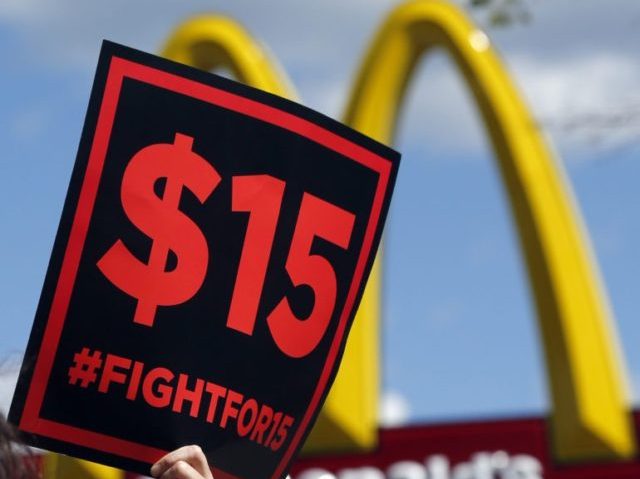San Diego’s experimental minimum hourly wage policy is killing job growth, according to a report from The San Diego Union-Tribune.
Although California is set to increase the state minimum wage from $10.50 to $15 by 2023, San Diego has already enacted a similar policy, forcing employers operating within the confines of the coastal city to pay their employees a minimum of $11.50 an hour.
Lynn Reaser, chief economist at the Fermanian Business & Economic Institute at Point Loma Nazarene University, highlights the slowdown in the growth of food-service jobs that occurred shortly after the passage of the new wage policy.
“This was at a time when both overall economies performed similarly well,” Reaser said. “If job growth in the restaurant sector had just kept pace with the state’s performance … the industry could have created 5,200 jobs instead of the 1,300 that took place.” Last month growth turned negative, as the sector actually lost jobs.
Those who argue against the passage of minimum wage policies often theorize that hiking minimum wages will price low-skilled and uneducated workers – the most vulnerable of those seeking employment – out of the labor market entirely. Reaser concurs, arguing that such legislation will increase the barriers to employment for those who are truly struggling.
“Although restaurant employees who are able to retain their jobs or secure employment will be better off, others will find it more difficult to find work,” Reaser said “People with any kind of criminal record, unskilled, uneducated, or any homeless job seekers will find it more difficult.”
Those against minimum wage policy also theorize that the increased cost of labor will be passed directly onto consumers. Jim Phillips, the general manager of the Studio Diner in San Diego, explicitly admitted that he was forced to not only raise menu prices to offset his new costs, but that he was also forced to lay off a portion of his staff.
“Yes, we have raised menu prices. Yes, we’re going to raise them again,” Phillips said. who has laid off six employees and is looking to cut seven more. According to The San Diego Union-Tribune, he’s also “studying changes like eliminating bussers and greeters, and requiring servers to also clear dishes in smaller sections while keeping an eye on the entrance to help customers.”
Phillips isn’t the only restaurant owner who has been forced to scale back as a result of the new wage policy. Mike Pasulka, the co-owner of a sports grill has recently been forced to assign himself four shifts a week as a bartender to save on labor costs.
“When food prices go up in restaurants, people don’t go out as much,” he said. “Restaurants have cut back on their hours, and we are paring staff.”
Alan Krueger, a chief economic adviser to President Barack Obama argued in 2015 that a $15 minimum wage policy could lead to “undesirable and unintended consequences.”
Still, those who support such wage policy argue that the adverse effects that might be had on businesses will be counteracted by laborers who have more money to spend.
Concluding in The San Diego Union-Tribune, columinist Dan McSwain argues that “there’s plenty of potential for human suffering” as a result of minimum wage policies. “If your paycheck drops to zero, a 50 percent raise for your former colleagues provides cold comfort,” he finishes.
With firms like Starbucks and McDonald’s rolling out automation features in their stores like self-ordering kiosks, proponents of minimum wage laws might be forced to rethink their approach to ensuring that more laborers can find work in America’s evolving economy.
Tom Ciccotta is a libertarian who writes about economics and higher education for Breitbart News. You can follow him on Twitter @tciccotta or email him at tciccotta@breitbart.com

COMMENTS
Please let us know if you're having issues with commenting.